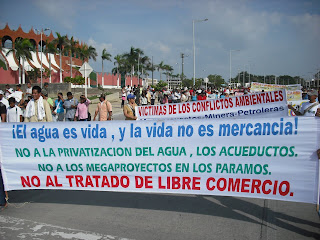
In 2008, the world witnessed the mobilization of tens of thousands indigenous demanding a new Colombia based on human rights and dignity. The Minga or “a gathering of people”, lead by the indigenous communities of Colombia, mobilized 30,000 people for six weeks to march from the city of Cali to Bogota, the Colombian capital. They marched, unabated, through police and military repression to present their five point agenda to the Colombia Government and the world. Today, they continue to gain support, mobilize, and resist.
The five point agenda of the Minga states:
1. No to the Free Trade Agreements and the so-called ‘free trade’ economic model.
2. No to terror, an instrument of the global system to dispossess peoples of their territories, rights and freedoms and deliver these to corporate interests through all the armed actors, each of whose presence reinforces that of the others and threatens the permanence of people in their communities, as well as the survival of democratic opposition and unions.
3. No to laws and constitutional reforms, which are the backbone of a political agenda designed to evict people from their lands, deny basic and essential rights and freedoms and deliver the country to the interests of transnational capital and accumulation.
4. Yes to the Colombian state honouring its previous agreements and obligations, regardless of who heads the government, with all Colombians, including indigenous, Afro-Colombian and other communities and sectors.
5. Yes to the weaving of a common agenda of the peoples. All causes are our own
Since the initial mobilization, the Minga has gathered support from all sectors of society. It seems that Colombia is rising up with one voice. In October of 2009, again, they presented their proposal for a new Colombia. Thousands of people mobilized in 3 cities Cali, Bogota, and Cartagena. This time with the support of other organizations that are involved in the same struggle for land, dignity, and justice.
One of the groups that joined the Minga is Fedeagromisbol, a coalition of the peasant farming and mining communities in Southern Bolivar. For the last five years, they have met with the government to demand their rights to dignity and land. The agreements with Fedeagromisbol concern large-scale mining operations and mono cropping that threaten the lives and local economy of the communities along with state provided services, such as education and healthcare. The government has repeatedly failed to meet these agreements. Instead, the government has attempted to repress and silence the coalition through assassinations and illegal arrests of leaders.
On August 18th, 2009, yet again, the Colombia governments refused to talk to Fedeagromisbol. After waiting for 2 days for the government to show up, Fedeagromisbol declared a permanent assembly and decided to mobilize with the Minga. As a result, last October, the people of Southern Bolivar left their communities and traveled to Cartagena with thousands of others to demand that the Colombian Government listen to the 5 point agenda of the Minga and the voice of the people.

No comments:
Post a Comment